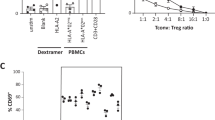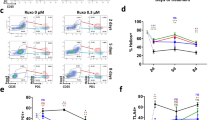Abstract
A major challenge in transplantation medicine is controlling the very strong immune responses to foreign antigens that are responsible for graft rejection. Although immunosuppressive drugs efficiently inhibit acute graft rejection, a substantial proportion of patients suffer chronic rejection that ultimately leads to functional loss of the graft1. Induction of immunological tolerance to transplants would avoid rejection and the need for lifelong treatment with immunosuppressive drugs1,2. Tolerance to self-antigens is ensured naturally by several mechanisms3; one major mechanism depends on the activity of regulatory T lymphocytes4,5. Here we show that in mice treated with clinically acceptable levels of irradiation, regulatory CD4+CD25+Foxp3+ T cells stimulated in vitro with alloantigens induced long-term tolerance to bone marrow and subsequent skin and cardiac allografts. Regulatory T cells specific for directly presented donor antigens prevented only acute rejection, despite hematopoietic chimerism. By contrast, regulatory T cells specific for both directly and indirectly presented alloantigens prevented both acute and chronic rejection. Our findings demonstrate the potential of appropriately stimulated regulatory T cells for future cell-based therapeutic approaches to induce lifelong immunological tolerance to allogeneic transplants.
This is a preview of subscription content, access via your institution
Access options
Subscribe to this journal
Receive 12 print issues and online access
$209.00 per year
only $17.42 per issue
Buy this article
- Purchase on Springer Link
- Instant access to full article PDF
Prices may be subject to local taxes which are calculated during checkout



Similar content being viewed by others
References
Lechler, R.I., Sykes, M., Thomson, A.W. & Turka, L.A. Organ transplantation—how much of the promise has been realized? Nat. Med. 11, 605–613 (2005).
Waldmann, H. & Cobbold, S. Exploiting tolerance processes in transplantation. Science 305, 209–212 (2004).
Stockinger, B. T lymphocyte tolerance: from thymic deletion to peripheral control mechanisms. Adv. Immunol. 71, 229–265 (1999).
Shevach, E.M. et al. The lifestyle of naturally occurring CD4+ CD25+ Foxp3+ regulatory T cells. Immunol. Rev. 212, 60–73 (2006).
Sakaguchi, S. et al. Foxp3+ CD25+ CD4+ natural regulatory T cells in dominant self-tolerance and autoimmune disease. Immunol. Rev. 212, 8–27 (2006).
Izcue, A., Coombes, J.L. & Powrie, F. Regulatory T cells suppress systemic and mucosal immune activation to control intestinal inflammation. Immunol. Rev. 212, 256–271 (2006).
Belkaid, Y., Blank, R.B. & Suffia, I. Natural regulatory T cells and parasites: a common quest for host homeostasis. Immunol. Rev. 212, 287–300 (2006).
Rouse, B.T., Sarangi, P.P. & Suvas, S. Regulatory T cells in virus infections. Immunol. Rev. 212, 272–286 (2006).
Aluvihare, V.R., Kallikourdis, M. & Betz, A.G. Regulatory T cells mediate maternal tolerance to the fetus. Nat. Immunol. 5, 266–271 (2004).
Beyer, M. & Schultze, J.L. Regulatory T cells in cancer. Blood 108, 804–811 (2006).
Joffre, O. & van Meerwijk, J.P.M. CD4+CD25+ regulatory T lymphocytes in bone marrow transplantation. Semin. Immunol. 18, 128–135 (2006).
Nishimura, E., Sakihama, T., Setoguchi, R., Tanaka, K. & Sakaguchi, S. Induction of antigen-specific immunologic tolerance by in vivo and in vitro antigen-specific expansion of naturally arising Foxp3+CD25+CD4+ regulatory T cells. Int. Immunol. 16, 1189–1201 (2004).
Golshayan, D. et al. In vitro-expanded donor alloantigen-specific CD4+CD25+ regulatory T cells promote experimental transplantation tolerance. Blood 109, 827–835 (2007).
Thornton, A.M. & Shevach, E.M. Suppressor effector function of CD4+CD25+ immunoregulatory T cells is antigen nonspecific. J. Immunol. 164, 183–190 (2000).
Le Moine, A. et al. Critical roles for IL-4, IL-5, and eosinophils in chronic skin allograft rejection. J. Clin. Invest. 103, 1659–1667 (1999).
Rocha, P.N., Plumb, T.J., Crowley, S.D. & Coffman, T.M. Effector mechanisms in transplant rejection. Immunol. Rev. 196, 51–64 (2003).
Joffre, O., Gorsse, N., Romagnoli, P., Hudrisier, D. & van Meerwijk, J.P.M. Induction of antigen-specific tolerance to bone marrow allografts with CD4+CD25+ T lymphocytes. Blood 103, 4216–4221 (2004).
Sykes, M. Mixed chimerism and transplant tolerance. Immunity 14, 417–424 (2001).
Boyse, E.A., Lance, E.M., Carswell, E.A., Cooper, S. & Old, L.J. Rejection of skin allografts by radiation chimaeras: selective gene action in the specification of cell surface structure. Nature 227, 901–903 (1970).
Ildstad, S.T., Wren, S.M., Bluestone, J.A., Barbieri, S.A. & Sachs, D.H. Characterization of mixed allogeneic chimeras. Immunocompetence, in vitro reactivity, and genetic specificity of tolerance. J. Exp. Med. 162, 231–244 (1985).
Sharabi, Y. & Sachs, D.H. Mixed chimerism and permanent specific transplantation tolerance induced by a nonlethal preparative regimen. J. Exp. Med. 169, 493–502 (1989).
Luo, B., Chan, W.F., Shapiro, A.M. & Anderson, C.C. Non-myeloablative mixed chimerism approaches and tolerance, a split decision. Eur. J. Immunol. 37, 1233–1242 (2007).
Vriesendorp, H.M. Aims of conditioning. Exp. Hematol. 31, 844–854 (2003).
Cosimi, A.B. & Sachs, D.H. Mixed chimerism and transplantation tolerance. Transplantation 77, 943–946 (2004).
Fudaba, Y. et al. Myeloma responses and tolerance following combined kidney and nonmyeloablative marrow transplantation: in vivo and in vitro analyses. Am. J. Transplant. 6, 2121–2133 (2006).
Salama, A.D., Womer, K.L. & Sayegh, M.H. Clinical transplantation tolerance: many rivers to cross. J. Immunol. 178, 5419–5423 (2007).
Jiang, S., Camara, N., Lombardi, G. & Lechler, R.I. Induction of allopeptide-specific human CD4+CD25+ regulatory T cells ex vivo. Blood 102, 2180–2186 (2003).
Gorelik, L. & Flavell, R.A. Abrogation of TGFβ signaling in T cells leads to spontaneous T cell differentiation and autoimmune disease. Immunity 12, 171–181 (2000).
Coudert, J.D., Coureau, C. & Guery, J.C. Preventing NK cell activation by donor dendritic cells enhances allospecific CD4 T cell priming and promotes Th type 2 responses to transplantation antigens. J. Immunol. 169, 2979–2987 (2002).
Corry, R.J., Winn, H.J. & Russell, P.S. Primarily vascularized allografts of hearts in mice. The role of H-2D, H-2K, and non-H-2 antigens in rejection. Transplantation 16, 343–350 (1973).
Acknowledgements
The authors would like to thank M.-C. Cuturi, J. Cohen and C. Reis e Sousa for valuable advice and critical comments on the manuscript, J.-C. Guéry for stimulating discussions, F. Powrie (University of Oxford, UK) and R. Flavell (Yale University) for transgenic mice, the personnel of the Institut Fédératif de Recherche 30, Institut Fédératif de Recherche 31 and Institut de Pharmacologie et de Biologie Structurale animal facilities for expert animal husbandry, F. Capilla for preparation of histological specimens, the personnel of the Institut Fédératif de Recherche 30 flow cytometry facility for technical assistance, and C. Joffre for her permanent support. This work was supported in part by grants from the Région Midi Pyrénées (nos. 01008776 and 03011999), the Etablissement Français des Greffes (2003), the Roche Organ Transplantation Research Foundation (ROTRF no. 133456773) and the Ligue Nationale contre le Cancer (no. GL/VP-4825 to O.J.).
Author information
Authors and Affiliations
Contributions
O.J. and T.S. performed, and contributed to the design of, the in vitro and in vivo experiments and interpreted results; D.C. designed and performed cardiac transplantations; T.A.S. helped in the design and interpretation of histological analysis; D.H. and P.R. contributed to the design of experiments and interpretation of results; J.P.M.v.M. directed the study and wrote the paper; and all authors contributed to writing and critically reviewing the manuscript.
Corresponding author
Supplementary information
Supplementary Text and Figures
Supplementary Figs. 1–4 and Supplementary Notes 1–3 (PDF 3685 kb)
Rights and permissions
About this article
Cite this article
Joffre, O., Santolaria, T., Calise, D. et al. Prevention of acute and chronic allograft rejection with CD4+CD25+Foxp3+ regulatory T lymphocytes. Nat Med 14, 88–92 (2008). https://doi.org/10.1038/nm1688
Received:
Accepted:
Published:
Issue Date:
DOI: https://doi.org/10.1038/nm1688
This article is cited by
-
Process development and validation of expanded regulatory T cells for prospective applications: an example of manufacturing a personalized advanced therapy medicinal product
Journal of Translational Medicine (2022)
-
CAR-Tregs as a Strategy for Inducing Graft Tolerance
Current Transplantation Reports (2020)
-
The pursuit of transplantation tolerance: new mechanistic insights
Cellular & Molecular Immunology (2019)
-
Transient increase of activated regulatory T cells early after kidney transplantation
Scientific Reports (2019)
-
An anti-CD103 antibody-drug conjugate prolongs the survival of pancreatic islet allografts in mice
Cell Death & Disease (2019)



